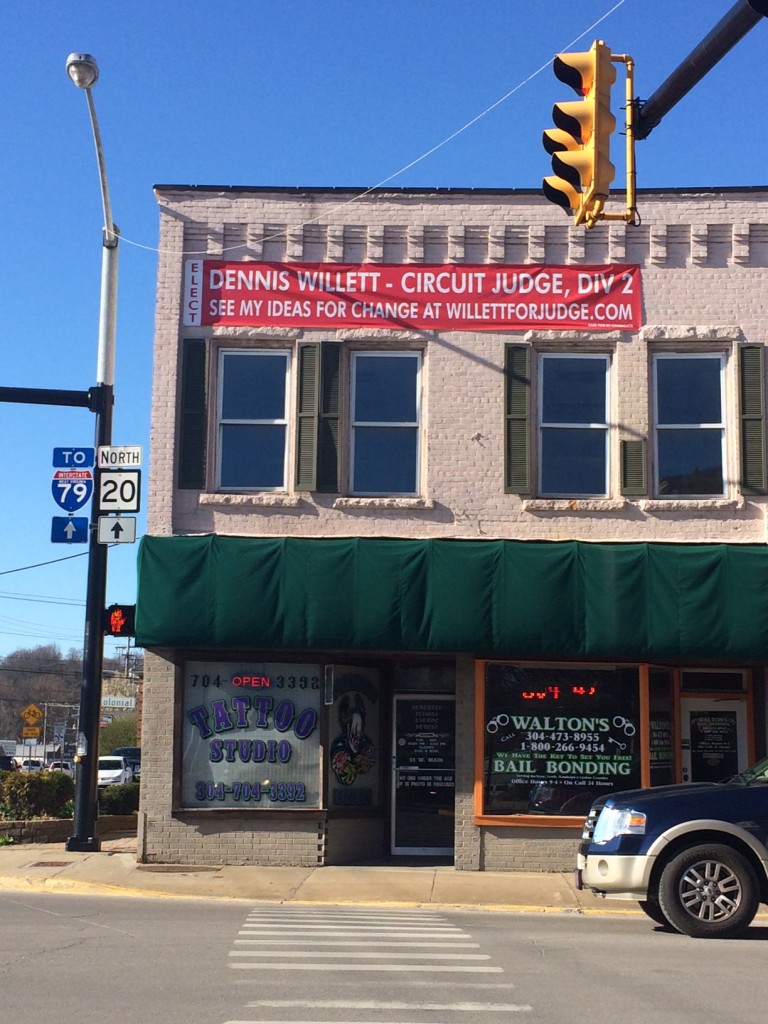 I should be sleeping off my jet lag but I’m wide awake, probably due to the drip fed Twinings that I have been brewing since I set foot in the door – enough to make up for all the awful, mediocre and downright undrinkable cups of “hot tea” that I have suffered over the last three weeks in an attempt to fend off the caffeine withdrawal headaches (I don’t do coffee, the American’s don’t do tea).
I should be sleeping off my jet lag but I’m wide awake, probably due to the drip fed Twinings that I have been brewing since I set foot in the door – enough to make up for all the awful, mediocre and downright undrinkable cups of “hot tea” that I have suffered over the last three weeks in an attempt to fend off the caffeine withdrawal headaches (I don’t do coffee, the American’s don’t do tea).
Every time I visit I forget how many little things are different, notwithstanding everything we have in common with our special friends across the pond. And how significant some of those little things are. Having to order hot tea with milk is one (take your own teabags, Lipton’s is vile, drink it black if they offer you creamer or half and half). Having to remember that every mean comes with cheese in, on or under it, and that “cheese” and “cheddar” bear no resemblance to what we would call “cheese” (let alone Cheddar) is another (I had a large chunk of extra mature English Cheddar with my cuppa too and boy was it gorgeous). And did I mention my discovery this trip that the chilli in so-called-chilli-dogs doesn’t have chilli in it? (I made a chilli con carne with CHILLI in it tonight in protest). That said, a chilli dog (even if it is a misnomer) is a fine thing indeed. I highly recommend Hillbilly Hotdogs if you’re ever passing through Lesage, West Virginia.
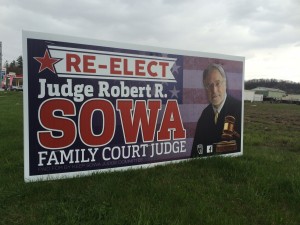 It’s not just food either. If I had a dollar for every American Flag I could see painted on something, hanging off something, or decorating someone’s house, shop, car, child or pet I would be very very wealthy. The only thing that is more prevalent than the stars and stripes is God – particularly in the parts I tend to visit (mainly West Virginia – family connections). It is woven through everything, intermingled with commercials, on road side signs, on humorous (and often mysoginistic) plaques to put on your wall, on mugs, on t-shirts and throughout communities. And in election campaigns for judges (oh yes). Friends I chewed the fat with on this visit – about the rise of the Tea Party and of Trump and Cruz et al – spoke of a sense that America had lost its identity. For me, coming from the UK once every few years, America’s identity is restated everywhere at all times – in fact, it seems more so every time I visit. America is all about America every minute of every day. As it always has been. If anything it is a caricature of itself, not a washed out echo of it. Whatever else it may need to worry about, I don’t think America needs worry that it’s identity has been lost or forgotten.
It’s not just food either. If I had a dollar for every American Flag I could see painted on something, hanging off something, or decorating someone’s house, shop, car, child or pet I would be very very wealthy. The only thing that is more prevalent than the stars and stripes is God – particularly in the parts I tend to visit (mainly West Virginia – family connections). It is woven through everything, intermingled with commercials, on road side signs, on humorous (and often mysoginistic) plaques to put on your wall, on mugs, on t-shirts and throughout communities. And in election campaigns for judges (oh yes). Friends I chewed the fat with on this visit – about the rise of the Tea Party and of Trump and Cruz et al – spoke of a sense that America had lost its identity. For me, coming from the UK once every few years, America’s identity is restated everywhere at all times – in fact, it seems more so every time I visit. America is all about America every minute of every day. As it always has been. If anything it is a caricature of itself, not a washed out echo of it. Whatever else it may need to worry about, I don’t think America needs worry that it’s identity has been lost or forgotten.
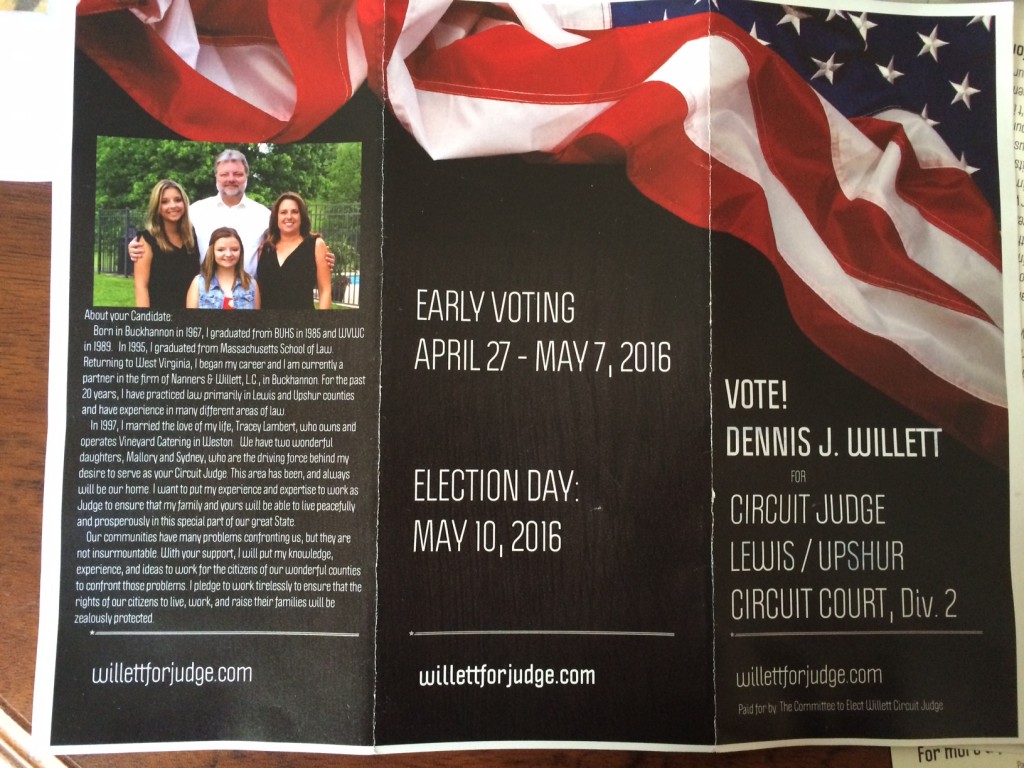 This visit though, I was knocked sideways by the state wide judicial elections that are currently running. Now, I knew that in the US many judicial posts are elected, but this is the first time I had seen an actual campaign – or the campaign material. On most visits I am shouting “stop the car there’s a turkey / deer / groundhog” – this trip it was campaign roadside banners and posters I was obsessed with photographing. Sadly I could not bag a pic of the 100m high judicial re-election advert juxtaposed with an adult store advert that we spotted from the interstate, and this is nothing like a representative sample – but I got a few to give you a flavour. And at every store, gas station or rest area where leaflets were laid out I bagged one for posterity. The striking feature of these campaign materials is not just that they are for electing judicial office holders, not even that they are basically adverts (although those things are weird enough to us Englishers), but that they are often selling a candidate on the basis of their credentials as upstanding and active members of the church, wholesome family men and women (there were women although I don’t have any in my sample) who have held down manual or blue collar jobs in their past. Adverts almost invariably feature the candidate posing with his wife and children and a lengthy CV of a host of prior community posts and works and wholesome American hobbies.
This visit though, I was knocked sideways by the state wide judicial elections that are currently running. Now, I knew that in the US many judicial posts are elected, but this is the first time I had seen an actual campaign – or the campaign material. On most visits I am shouting “stop the car there’s a turkey / deer / groundhog” – this trip it was campaign roadside banners and posters I was obsessed with photographing. Sadly I could not bag a pic of the 100m high judicial re-election advert juxtaposed with an adult store advert that we spotted from the interstate, and this is nothing like a representative sample – but I got a few to give you a flavour. And at every store, gas station or rest area where leaflets were laid out I bagged one for posterity. The striking feature of these campaign materials is not just that they are for electing judicial office holders, not even that they are basically adverts (although those things are weird enough to us Englishers), but that they are often selling a candidate on the basis of their credentials as upstanding and active members of the church, wholesome family men and women (there were women although I don’t have any in my sample) who have held down manual or blue collar jobs in their past. Adverts almost invariably feature the candidate posing with his wife and children and a lengthy CV of a host of prior community posts and works and wholesome American hobbies.
This is just a million miles away from things here. Here, quite apart from the fact that there is an independent appointments system, judges are appointed on the basis of their legal and judicial skill and experience and little is known about their family life either by the appointments panel or the community they serve. Judges here may have a preference for an appointment in a particular locality but they do not apply for a post in a specific court or community – whereas the individuals being elected are elected by their local community to whom they are most likely well known – and well known for a particular stance on key issues such as drugs and crime. In further contrast to our judges, who are one removed from the rest of us, many of the candidates include their phone number, email, facebook page or website on their materials – I cannot imagine any judge here publishing a picture of him/herself with spouse and children, and giving all their names and details of their occupations and achievements and the church at which they worship. The private life of a judge is pretty much private here (unless you have 7 pointedly named pigs or have been named and shamed as an Evil Corrupt Family Court Judge).
Drugs and crime seem to be a particular issue in West Virginia in particular (I can’t vouch for other states but anticipate there are similar issues, although I think they are particularly pronounced in West Virginia which has some real economic challenges due to the decline of the coal industry). Most of the friends I spoke with told me of a chronic, statewide problem around over-prescription of pain medication pills (due to the unhealthy influence of Big Pharma on frontline medicine), which has led to a boom in illegal drug use, in particular heroin and meth. I did not meet one West Virginian who didn’t flag this as a problem, it is a widespread belief. As one might expect therefore, there is lots of talk in campaign material of getting tough on crime and drugs – which perhaps means more and longer sentences. The need to talk tough on drugs and crime in order to secure judicial office is something that makes me feel a little queasy. The overt suggestion that a judge would be motivated by his own personal circumstances, i.e. the need to protect his own family, is also really rather counterintuitive – we are used to constructing judges as impartial and as leaving their personal convictions and interests at the door. Perhaps our approach is a fiction and theirs is just more honest :
“Over the past several years…I have become concerned with the rise of crime and drug abuse that threatens the safety of my family and yours and I want to do something about it.” [Dennis Willett campaign material]
 But here it seems judges are seen very much more as part of rather than separate from the community that they serve. Not some high and mighty highly educated, legal boffin, but one of us – churchgoer, family man, sports fan, hunter – oh, and lawyer too. Perhaps this is a little like our notion that magistrates represent the delivery of local community justice by our community peers (I say “notion” advisedly, it is sadly the case that our Magistracy remains pretty unrepresentative of the communities it serves notwithstanding some initiatives to change that).
But here it seems judges are seen very much more as part of rather than separate from the community that they serve. Not some high and mighty highly educated, legal boffin, but one of us – churchgoer, family man, sports fan, hunter – oh, and lawyer too. Perhaps this is a little like our notion that magistrates represent the delivery of local community justice by our community peers (I say “notion” advisedly, it is sadly the case that our Magistracy remains pretty unrepresentative of the communities it serves notwithstanding some initiatives to change that).
There is some talk in publicity material of judges being unbiased, but here it means I think something different from what we would anticipate. It seems to be referring specifically to the requirement to be non-partisan in the sense of not party-political. What it doesn’t mean is judges steering clear of policy making – this stuff is ALL about policy making. See in particular Dennis Williett’s campaign website, where he sets out his “program initiatives” for crime reduction and the sentencing approach he will take as judge to repeat offenders – policy making writ large.
To be clear, I’m not writing this post in an attempt to ridicule or criticise the system that operates elsewhere. I’m very conscious that our system is imperfect in a number of different ways – and that the distancing between judiciary and “real people” in this jurisdiction has both its strengths and disadvantages in terms of the delivery of justice and confidence in the system. Some of the US lawyers I spoke to scoffed at the notion of an “independent” appointments system – and one thing that an electoral system certainly does is to level the class and educational barriers to judicial office, even if the quid pro quo may be that a judge in an electoral system is rather more likely to be on the Daily Mail end of the political spectrum than in an appointed system. It is of course, only very recently that we have evolved from the secret soundings and tap on the shoulder “system” – and our appointments and judicial training systems are themselves in their infancy. Not entirely unfairly my american lawyer friends said “but who appoints the appointers?”
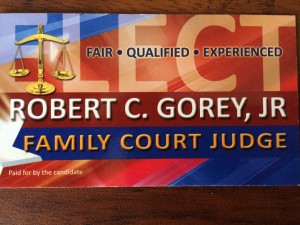 What I wanted to share was the experience I had of continual double takes at this very in-your-face approach to judges which is so odd when looked at by a tea drinking lawyer from across the pond who is used to judges being up there on the bench not down here with the sports fans. Whilst I don’t like the idea of judicial elections much at all, it is instructive to think about how other jurisdictions approach things and what pros and cons that throws up – and how the pros might be recreated elsewhere. I’d be interested to know what others think. I’m pretty sure our legal system looks mighty odd to a foreigner too (lets face it, some days it looks pretty weird to an insider as well).
What I wanted to share was the experience I had of continual double takes at this very in-your-face approach to judges which is so odd when looked at by a tea drinking lawyer from across the pond who is used to judges being up there on the bench not down here with the sports fans. Whilst I don’t like the idea of judicial elections much at all, it is instructive to think about how other jurisdictions approach things and what pros and cons that throws up – and how the pros might be recreated elsewhere. I’d be interested to know what others think. I’m pretty sure our legal system looks mighty odd to a foreigner too (lets face it, some days it looks pretty weird to an insider as well).
I’ll leave you with this profound thought from one candidate for the position of Magistrate :
“Since I returned to Philippi, I have adopted the phrase, “I don’t care if their dog ate your cat ten years ago”. [Chris Mulneix campaign material]
(nope, I don’t know either)
I see as I proof read this that this is a slightly meandering “thing” of a blog post. I think this is the product of jet lag who I hold wholly responsible for any errors or stupidity in this post. Off to bed now, although my belly is telling me it is breakfast time…
[UPDATE 15/4/16 : Thanks to @goyalam for pointing me to this brilliant but scary John Oliver clip about the US approach to the election of judges – apparently the only other country who do this is Bolivia. As an honorary American, he is slightly less polite than me, but I’m reassured to find my gawping reaction was not dissimilar to his…]
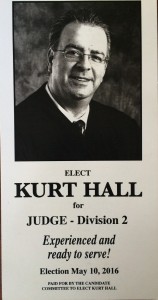

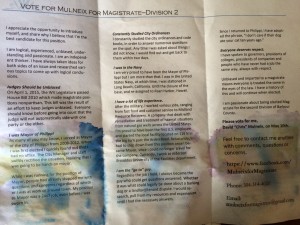

I think we ought to know more about our judges. If the judge you go before used to be a barrister who was instructed by the other parties solicitor I think you should know. If that judge also had a business venture with a partner from the other parties solicitor I think you should know that too.
Public accountability for judges is a very good thing, justice must be seen to be done. Accountability to other judges through appeal is not a good thing, as your FOI request on appeals shows.
I agree that potential conflicts of interest should be flagged but the reality is most judges will have been instructed at some stage by many of the solicitors appearing in front of them. I’m not sure that a single past instruction really amounts to conflict or the appearance of it. Current or recent significant financial relationships or connections yes. Indeed judges will generally be appropriately cautious and identify potential conflict at the outset of a case and establish whether anybody involved takes an issue with it, as is entirely proper. If they do the judge can then decide, having heard argument, whether to recuse himself / herself.
I was going to refer you to the John Oliver clip too, but someone has beaten me too it. I love Last Week Tonight.
can i get it on tv or do i need to watch it on youtube???
Very interesting. But i don’t understand thr link between over use of painkillers and high rate of illegal drugs. Does taking too much asprin make people crave heroin?
I think because they are prescribing things like oxycodone which is a synthetic opiate…
This is an interesting subject. For my part I dislike the idea of a judge having in the back of his mind the idea that a judge could be ignoring my lawyers and instead thinking “I wonder how I can use this case to build my reputation as tough of crime/a man of the people/a champion of civil liberties”
You are fortunate to have come across this phenomenon in West Virginia which (IIRC) is not a death penalty state. Plenty of US judicial elections end up focusing on who has or will put the most people to death. E.g. http://www.reuters.com/investigates/special-report/usa-deathpenalty-judges/